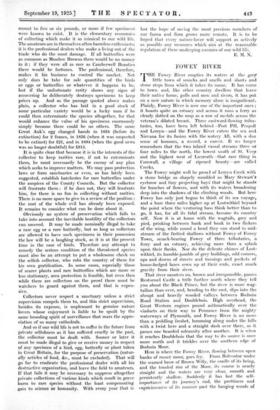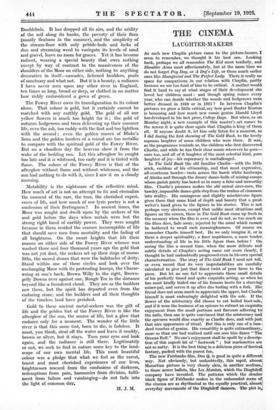FOIVEY RIVER
THE Fowey River empties its waters at the grey little town of smacks and smells and slants and stone steps from which it takes its name. It has come to town and, like other country dwellers that leave their native home, gulls and men and rivers, it has put on a new nature in which memory alone is insignificant. Plainly, Fowey River is now one of the important ones ; it boasts quite an estuary and across it runs a ferry as clearly dotted on the map as a row of medals across the veteran's dilated breast. Three eastward-flowing tribu- taries, too, have been left behind—Port Pill, Penpoll and Lerryn—and the Fowey River enters the sea and Nirvana for its fusion with the watery All, with a due sense of honours, a record, a career. It na longer remembers that the two inland vassal streams three or four miles to the north, the lowest south of St. Veep and the highest west of Lanreath—that rare thing in Cornwall, a village of ripened beauty—are called Creeks.
The Fowey might well be proud of Lerryn Creek with a stone bridge as shapely moulded as Mary Stewart's eyebrow and tiny projecting bayi that might be stands for bunches of flowers, and with its waters broadening deep into the shadows of the climbing woods. But here Fowey has only just begun to think of its sea voyages and a bare three miles higher up at Lostwithiel beyond the point where the venturing bass think better than to go, it has, for all its tidal stream, become its country self. Now it is at home with the wagtails, grey and pied, prinking between bank and bank in two flickers of the wing, while round a bend they can stand in mid- stream of the fretted shallows without Fowey of Fowey Town, smack-bearing Fowey of three tributaries, a ferry and an estuary, achieving more than a splash upon their flanks. Nor do the delicate chimes of Lost- withiel, its humble-jumble of grey buildings, odd corners, ups and downs of streets and turnings and pockets of house-hedged lanes sewn up at their ends, exact much gravity from their river.
That river saunters on, brown and irresponsible, passes Restormel Castle a trifle further north where they tell you about the Black Prince, but the river is more wag- tailian than ever, and, bending to the east, slips into the abrupt and heavily wooded valleys between Bodmin Road Station and Doublebois. High overhead, the Great Western engines pound asthmatically over the viaducts on their way to Penzance from the mighty waterways of Plymouth, and Fowey River is no more than a peddling freshet, humming along under the hills with a twist here and a straight dash over there, as it passes one bearded solemnity after another. It is when it reaches Doublebois that the way to its source is once more north and it trickles over the southern edge of Bodmin Moor.
Here is where the Fowey River, flowing between open banks of russet moor, goes fey. From Bolventor under the seamed brow of Brown Willy, the cradle of its being, and the tousled rim of the Moor, its course is nearly straight and the waters are very clear, smooth and persistently shallow. Suddenly it has lost the self- importance of its journey's end, the prettiness and capriciousness of its manner past the hanging woods of Doublebois. It has dropped all its airs, and the aridity of the soil along its banks, the poverty of their flora (mostly fleabane in the summer), and the simplicity of the stream-floor with only pebble-beds and locks of dun and streaming weed to variegate its levels of sand and gravel, leave no room for graces. Yet it has become radiant, wearing a special beauty that owes nothing except by way of contrast to the massiveness of the shoulders of the Moor on either side, nothing to anything decorative in itself—cascades, lichened boulders, pools of sanctuary and what not. But it is a beauty, a radiance I have never seen upon any other river in England, ten times as long, broad or deep, or clothed in no matter how richly embroidered a gown of green.
The Fowey River owes its transfiguration to its colour alone. That colour is gold, but it certainly cannot be matched with any earthly gold. The gold of all our yellow flowers is much too bright for it ; the gold of autumn hedgerows and trees delivering up their summer life, even the ash, too ruddy with the first and too lightless with the second ; even the golden manes of Blake's lions and the golden borders of a missal are too metallic to compare with the spiritual gold of the Fowey River. But on a cloudless day the heavens show it from the wake of the bedding sun. Let this afterglow be caught too late and it is whitened, too early and it is tinted with flame. The colour of the Fowey River is that of the afterglow without flame and without whiteness, and the sun had nothing to do with it, since I saw it on a cloudy morning.
Mutability is the nightmare of the reflective mind. How much of art is not an attempt to fix and eternalize the moment of the rare, the true, the cherished experi- ences of life, and how much of our lyric poetry is not a confession of their fleetingness ? In ancient times, the Moor was sought and dwelt upon by the seekers of tin and gold before the days when metals were but the strong right hand of earthly power. They were sought because in them resided the essence incorruptible of life that should save men from mortality and the fading of all brightness. On the swart heights that lift their masses on either side of the Fowey River whence was -washed three and four thousand years ago the gold that was not yet dust, the seekers set up their rings of mono- liths, the sacred stones that were the habitacles of deity. Stand within one of these circles and look over the unchanging Moor with its protruding humps, the Cheese- wring at one's back, Brown Willy to the right, Brown- gelly Downs over against one, Rough Tor in the distance beyond like a foundered cloud. They are as the builders saw them, but the spirit has departed even from the enduring stone, and the builders and all their thoughts of the timeless land have perished.
Gold to these ancient metal-seekers was the gift of life and the golden tint of the Fowey River is like the afterglow of the sun, the source of life, but a glow that endures only for a moment. The wonder of the little river is that this same tint, born to die, is fadeless. It must, you think, steal off the water and leave it muddy, brown or silver, but it stays. Turn your eyes and look again, and the radiance is still there. Legitimately or not, we seek to find in nature some key to the land- scape of our own mental life. This most beautiful colour was a pledge that what we feel as the rarest, truest and most cherished experiences of our lives, brightnesses rescued from the confusions of darkness, redemptions from pain, harmonies from division, fulfil- ment from failure and vainlonging—do not fade into the light of common day.
H. J. M.











































 Previous page
Previous page